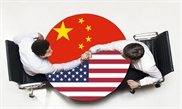
Illustration: Liu Rui/GT
A black swan event is a metaphor that describes an unpredictable occurrence that carries severe consequences and in hindsight possessed signs that made it obvious it is was going to happen, according to former trader Nassim Nicholas Taleb who coined the term.The coronavirus (COVID-19) pandemic is considered a black swan due to its devastating effect on human health, social order, the economy, and global relations. Its impact will cause a major reshuffling in diplomacy, military, and trade among global uncertainty, which could lead to subsequent black swan events.
History has proven that seismic changes and chaotic relationships among nation-states are predictable due to wars, famines, and epidemics. Whether the US accelerates decoupling with China is among the top post-pandemic changes that have caused speculators to predict future black swan events.
As Western countries struggle with their capabilities in handling COVID-19, their hegemonic power has been shaken, along with their position in the world's economy and governance. This trend is revealed through limited productivity, disrupted supply chains, paralyzed military power, global trade stagnation, and a failure of the US financial system to prevent multiple stock market crashes.
Despite the struggles, Western countries that traditionally hold vested interests, continue to constrain and create trouble for China, a country with superior capabilities necessary to defeat COVID-19 and protect its citizens.
Decoupling from China is not a new idea. Before the pandemic, and as the trade war escalated, the possibility of decoupling was real. Public concern was heightened by the China-US trade war, while COVID-19 accelerated a global shutdown on transportation and trade.
Decoupling is a remote possibility should the US make their economy its top priority. If they place security first, decoupling would become a reality, but at a higher cost to the US.
Unlike China, the industrial chains of most Western countries skews to the middle and upper classes, leaving low-end production capacity and manufacturing vacant. The gap could lead to a massive supply chain restructuring in the next round of competition, and trigger more black swan events during global economic reconstruction.
China needs to be prepared for a decoupling, non-decoupling, and semi-decoupling with the US. Taking the initiative of the industrial chain would be a key response factor and one that would best highlight China's development advantages and consumer market potential.
Black swan events are likely to hit the military and geopolitical spheres. The US, as it recovers from the outbreak, could use smaller countries as political pawns to seek opportunities and create excuses for conflict in a reshuffled political landscape.
US combat capability weakened after its carrier fleet was hit hard by COVID-19, thus eroding hegemonic military power, yet its threat remains as the US creates conspiracy theories and conflicts.
Cross-Straits relations have the potential for a black swan event to emerge. Taiwan politicians continue to create trouble by slandering the World Health Organization (WHO) for its joint efforts with the Chinese mainland in fighting COVID-19 while also verbally attacking WHO head Tedros Adhanom Ghebreyesus with racist remarks.
These problems, fueled by US officials, continue to challenge the bottom line principles of Cross-Strait relations.
The South China Sea issue should also not be ignored. Irregular intrusion of US warships in foreign waters has made waves in the region and created tension for regional security.
Had COVID-19 not hit the US carrier fleet, it would probably be sailing the world amid the pandemic to create more troubles for China.
The author is associate professor at the School of Law of Nankai University. This is the first of a series of articles on black swan events the world will face post-pandemic.opinion@globaltimes.com.cn

